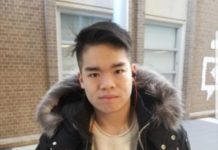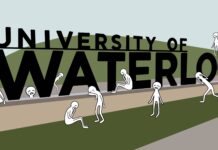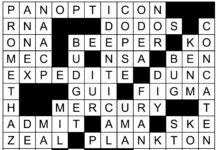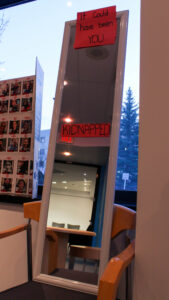
Shye Klein, a Canadian-Israeli photographer who survived the attack on the Supernova music festival by Hamas on Oct. 7, spoke to members of the UW community on April 9 about his experience that day. The attack killed roughly 1,200 Israelis and foreigners, and sparked an ongoing war which has killed over 30,000 Palestinians, according to Gaza’s Ministry of Health.
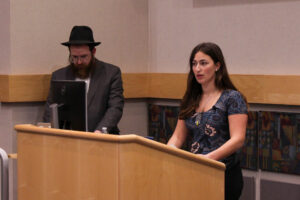
The event was organized by Noa Boulakia, a second year biomedical engineering student who reached out to Klein to bring him to UW after seeing that he had spoken at other universities across Canada and the United States. She hopes that as a result of Klein’s session, people will learn to verify their facts and sources of information, and stop reposting what is “trend[y].”
“Nobody looks for the actual truth,” she said.
Klein, who has given similar talks in other universities across North America including the University of Guelph, Western University, and McMaster University, gave a presentation detailing his experience at the festival leading up to the attack, as well as the chaos of its immediate aftermath.
Boulakia gave an opening statement in which she rebuked the idea circulated by some that Hamas’ attack could be considered resistance, asking the audience, “Is it a resistance to kill children hiding under their beds? Is it a resistance to throw grenades into civilian bomb shelters? Is it resistance to rape, kidnap and to kill young people like you and me attending a music festival for peace?”
“I hope you understand that there may be nuance to this subject, but there is not a nuance to this war,” she continued. “We must condemn Hamas and help support the IDF [Israel Defense Forces].”
Klein described the atmosphere of the festival upon arriving on Oct. 7 at 2 a.m. as very friendly and positive. At the time, he did not know that Gaza was roughly six kilometres west of the festival grounds.
Klein detailed the next four hours of walking around the festival and meeting other attendees until 6:30 a.m., when attendees saw the initial barrage of rockets. Due to the amount of rockets so close to the festival grounds, Klein and the group he came with ultimately decided to leave the festival, though many other attendees maintained a nonchalant attitude towards the situation.
When leaving at around 7:55 a.m. the group heard gunfire and screaming from the festival grounds, which by then had been infiltrated by Hamas militants. They then encountered traffic and police blocks in their attempts to leave the festival, which forced them to drive through fields east from the Gaza Strip, away from Hamas. Eventually, Klein’s group arrived safely at his cousin’s apartment at 9:45 a.m. Later, he found out that two of the people he’d met at the festival had been killed by Hamas.
The presentation interspersed Klein’s first hand photo and video coverage, such as portraits of the people he met at the festival, and videos documenting the group’s escape, including one where the group had to drive straight past Hamas gunmen.
Klein said that he focuses on spreading his experience both because he is capable of doing so — being a fluent English speaker and having the emotional capacity for it — and because he feels it is one of the best ways to help.
At the end of Klein’s presentation, Boulakia referenced a Harvard Harris poll where 53 per cent of those aged 18 to 24 supported an unconditional, “drop everything” ceasefire, whereas 47 per cent of that age group supported a ceasefire only after the release of all hostages and the removal of Hamas from power. Currently, over 100 Israelis remain unaccounted for after being kidnapped in October by Hamas.
“The youth don’t realize that there was a ceasefire in place before this war happened,” she said, going on to state that youth are getting information from social media platforms like TikTok rather than verifiable media outlets. “[I]f that had been done, I am sure this [poll] would be very different.”
Despite the ceasefire brokered in 2021 by Egypt and Qatar, violence in the region in the months leading up to the Oct. 7 attacks had been escalating, with 32 Israelis killed by Palestinian attacks and 247 Palestinians killed by Israeli attacks.
In his closing statements, Rabbi Moshe Goldman, UW’s Jewish chaplain, called for those on campus to have courage to look for the truth, and applauded the university for having courage by making “no fuss” about the event. “Instead of being tribal, instead of being driven by emotion, you really have to cultivate a love for the truth, which takes courage because it’s going to conflict with biases. It’s going to conflict with some very deeply held emotions,” he said to Imprint, stating that it doesn’t take courage to do the easy thing and “go with the flow.”
As for what that truth-seeking might look like, Boulakia said that while she sees many posters stating Israel is committing genocide or that UW is funding genocide, “any posters that are put up by… the Jewish student club Hillel are torn down maybe seconds after,” adding a point made in the presentation where a poster promoting Klein’s event was torn down nine minutes after being put up.
“It shows a lack of respect towards others,” Boulakia continued. “I would never tear down a poster. Everybody has the right to share whatever they want. This is a free country and people can share that same level of respect for us. It’s not a crazy ask.”
The vandalizing of posters has also been a concern for Palestinian campus groups, like UWaterloo Voices for Palestine, who confirmed to Imprint that one poster, stating that an eight-year-old Palestinian girl had been killed by Israeli air strikes, had “Terrorist in Training” graffitied across it. “We can see the level of dehumanization and racism it takes to justify the killing of a Palestinian child solely because they were Palestinian,” the group wrote.




























